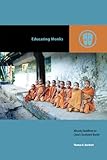Educating Monks : Minority Buddhism on China's Southwest Border / Thomas A. Borchert; ed. by Mark Michael Rowe.
Material type: TextSeries: Contemporary BuddhismPublisher: Honolulu : University of Hawaii Press, [2017]Copyright date: ©2017Description: 1 online resource (272 p.) : 9 b&w illustrations, 2 mapsContent type:
TextSeries: Contemporary BuddhismPublisher: Honolulu : University of Hawaii Press, [2017]Copyright date: ©2017Description: 1 online resource (272 p.) : 9 b&w illustrations, 2 mapsContent type: - 9780824866488
- 9780824866525
- online - DeGruyter
- Issued also in print.
| Item type | Current library | Call number | URL | Status | Notes | Barcode | |
|---|---|---|---|---|---|---|---|
 eBook
eBook
|
Biblioteca "Angelicum" Pont. Univ. S.Tommaso d'Aquino Nuvola online | online - DeGruyter (Browse shelf(Opens below)) | Online access | Not for loan (Accesso limitato) | Accesso per gli utenti autorizzati / Access for authorized users | (dgr)9780824866525 |
Frontmatter -- Contents -- Series Editor's Preface -- Acknowledgments -- Note on Languages, Pronunciation, and Names -- Abbreviations -- Introduction. Buddhism and Monastic Education, Within and Across Borders in the New Millennium -- Part 1. Shaping Buddhist Lives in Sipsongpannā -- 1. Local Monks in Sipsongpannā -- 2. Fortune-Telling And False Monks: Defining and Governing Religion -- 3. Monks on the Move. Dai-Lue Monastic Networks -- Part 2. Educating the Monks of Sipsongpannā -- 4. Learning to Read in Village Temples and Chinese Public Schools -- 5. The Fragility of Autonomy: Curricular Education at Dhamma Schools -- 6. Transnational Buddhist Education and the Limits of the Buddhist Ethnoscape -- Afterword -- Notes -- Glossary -- References -- Index -- About The Author
restricted access online access with authorization star
http://purl.org/coar/access_right/c_16ec
Most studies of Buddhist communities tend to be limited to villages, individual temple communities, or a single national community. Buddhist monastics, however, cross a number of these different framings: They are part of local communities, are governed through national legal frameworks, and participate in both national and transnational Buddhist networks. Educating Monks makes visible the ways Buddhist communities are shaped by all of the above-collectively and often simultaneously. Educating Monks examines a minority Buddhist community in Sipsongpannā, a region located on China's southwest border with Myanmar and Laos. Its people, the Dai-lue, are "double minorities": They are recognized by the Chinese state as part of a minority group, and they practice Theravāda Buddhism, a minority form within China, where Mahāyāna Buddhism is the norm. Theravāda has long been the primary training ground for Dai-lue men, and since the return of Buddhism to the area in the years following Mao Zedong's death, the Dai-lue have put many of their resources into providing monastic education for their sons. However, the author's analysis of institutional organization within Sipsongpannā, the governance of religion there, and the movements of monks (revealing the "ethnoscapes" that the monks of Sipsongpannā participate in) points to educational contexts that depend not just on local villagers, but also resources from the local (Communist) government and aid form Chinese Mahāyāna monks and Theravāda monks from Thailand and Myanmar. While the Dai-lue monks draw on these various resources for the development of the sangha, they do not share the same agenda and must continually engage in a careful political dance between villagers who want to revive traditional forms of Buddhism, a Chinese state that is at best indifferent to the continuation of Buddhism, and transnational monks that want to import their own modern forms of Buddhism into the region.Based on ethnographic fieldwork and interviews with Dai-lue monks in China, Thailand, and Singapore, this ambitious and sophisticated study will find a ready audience among students and scholars of the anthropology of Buddhism, and religion, education, and transnationalism in Southeast and East Asia.
Issued also in print.
Mode of access: Internet via World Wide Web.
In English.
Description based on online resource; title from PDF title page (publisher's Web site, viewed 02. Mrz 2022)


